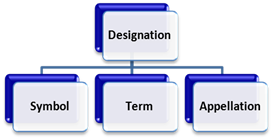The next standard to talk about is ISO 704 “Terminology work—Principles and methods.” It is an interesting one for a variety of reasons. For one, I have more questions than answers.
At the TKE (Terminology and Knowledge Engineering) Conference in Dublin, my esteemed colleagues, Hanne Erdman Thomsen, Sue Ellen Wright, Gerhard Budin and Loïc Depecker will devote a workshop to ‘Accommodating User Needs for ISO 704: Towards a New Revision of the Core International Standard on Terminology Work’. I will have a short time slot to provide input myself and therefore have been re-reviewing ISO 704 over the last few days.
As I am putting my thoughts together, I was wondering: Who knows or uses ISO 704? I would like to invite you to do two things: Click on the little survey below in this posting. And, if you haven’t done so, please tell me about yourself by participating in the survey on the Survey tab. Both surveys are anonymous and might help me understand what this standard could do. If you know the standard and have something to share about it, please leave a comment below. I would be very grateful to get your input.
Because, quite frankly, I am puzzling over this standard. I have read it three times over the past year and every time after a few weeks go by, I have to think about what this standard is actually for. I believe it stems from the fact that it is a bit wordy at the moment. It contains a lot of good information, but the presentation is ineffective.
 But now, what can it do for the reader? As its title says, it lays out the various principles underlying terminology management. For example, it tells us what objects, concepts, concept relations and concept systems are. It then goes into definitions and definition writing, before the subject of designations is discussed. Remember, this little graphic from What is a Term? As an aside, we talk about terms many times when we actually mean designations; in German, we even find the ugly Anglicism Term and its plural Terme.
But now, what can it do for the reader? As its title says, it lays out the various principles underlying terminology management. For example, it tells us what objects, concepts, concept relations and concept systems are. It then goes into definitions and definition writing, before the subject of designations is discussed. Remember, this little graphic from What is a Term? As an aside, we talk about terms many times when we actually mean designations; in German, we even find the ugly Anglicism Term and its plural Terme.
So, ISO 704 really does do what the title says, it presents us with principles and methods. It just doesn’t seem to stick with me. Yet.
[polldaddy poll=3539284]
I’m not saying that ISO 704 cannot be improved, but I have found it very useful. I first read it 6 or 8 years ago. I wish all of my colleagues who are involved in terminology management would read it so that we’d have a shared understanding of things such as concept relations and different ways of defining a term or concept.
Good to hear from you, John. Do you remember what you liked best about it? The version from 2000 was actually different than the current one. So, it would be good to know what you liked about the old one, if you still remember. In any case, appreciate your participation very much.
I think the 2000 version is the only one I’ve read. I have just been skimming through it again, and I think just about all of sections 5 through 7, plus Annex A–which is to say, virtually the entire standard–are very well organized, interesting, and useful. I especially like section 6, Definitions. I used to edit all of the glossary definitions at SAS. I found virtually nothing useful about what constitutes a good glossary definition anywhere else. In short, I think ISO 704 is an excellent primer for anyone who’s starting to do terminology work.
Thank you very much for taking the time to add these details, John. It seems like the old version was appreciated for exactly what you mentioned and it’s good to get the confirmation from you. I am off to Dublin this morning and will very likely quote you there. Thank you again.